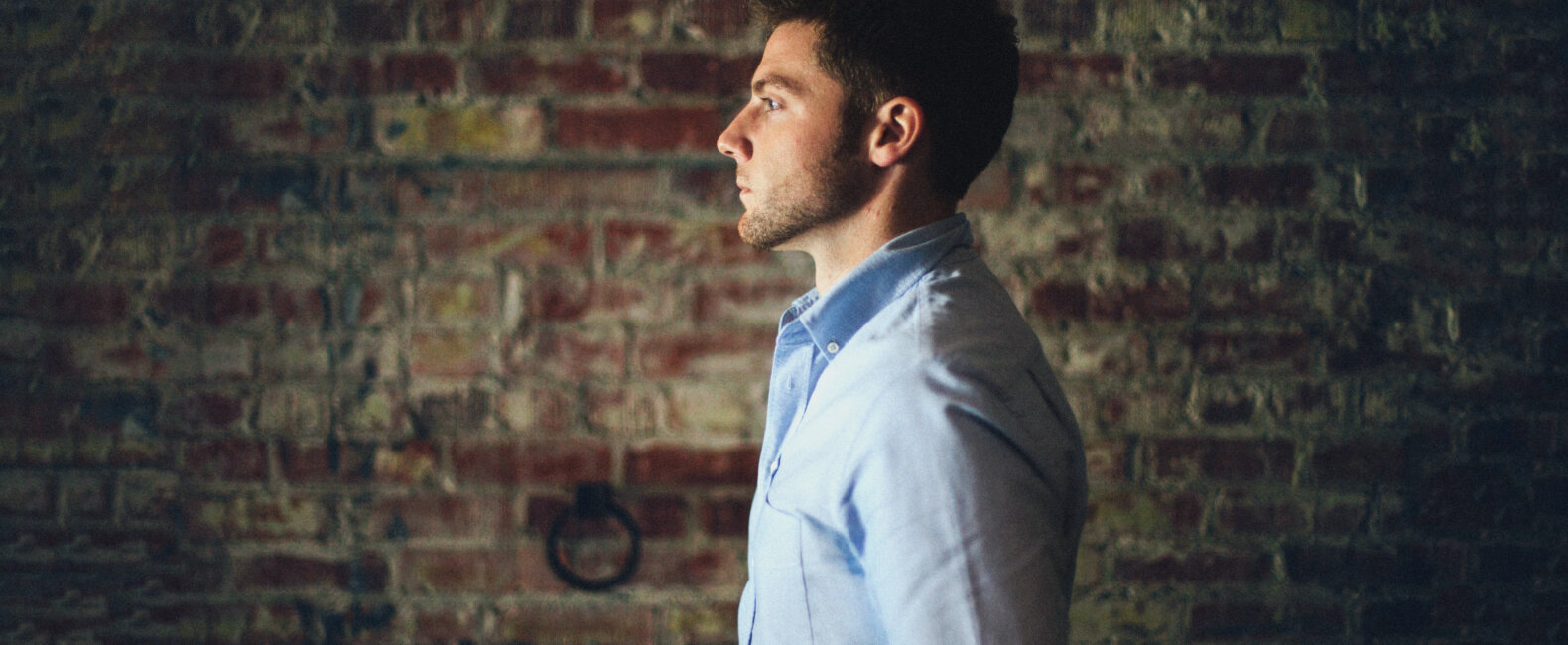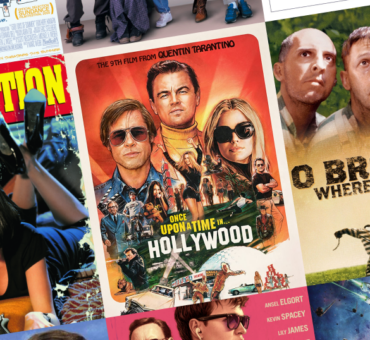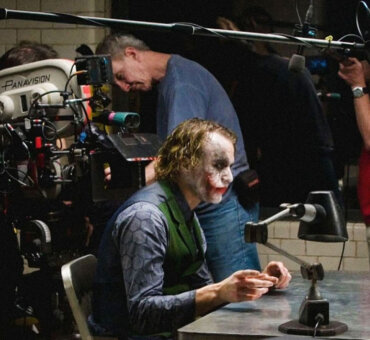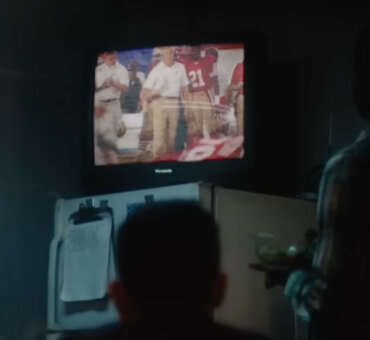Toward the end of this interview, things got pretty serious. Like when Tony said he’d recently broken his iPhone in half with his bare hands. By that point, though, we’d been talking for over an hour and I didn’t find his confession that surprising. Tony is a guy who takes his life and his work seriously. You can hear it immediately in his songs, and you can sense it almost immediately over the phone. This guy isn’t messing around. After starting his career with a pirated version of FruityLoops and a chance meeting with Hans Zimmer, Tony has gone on to score projects for some of the biggest brands and most influential filmmakers in the world. But none of it would have happened had he not gone through a series of complete and utter breakdowns.
Maybe the best way to get to know Tony is to let him speak for himself. Brace yourself: This is our conversation with the incomparable Tony Anderson.

About 13 or 14 years ago, my grandma gave me this ancient Dell computer — an old dinosaur with a huge monitor and a Pentium 1. Just a terrible computer. And the reason she gave it to me was because I told her I wanted this program called FruityLoops, which was basically an old-school sequencer. You didn’t have to know music. You could line things up on a grid like Tetris.
I grew up in South Florida around the dance music scene, and I was following guys like The Crystal Method and BT and Hybrid. It wasn’t just electronic music, and it wasn’t just cinematic…it was electro-cinematic, or at least that’s what I started calling it.
I got an illegal version of FruityLoops and started making the worst music I’ve ever heard in my life. And everyone agreed.
How old were you?
I must have been 13. I didn’t know music; I just knew how to make sounds. I tried to learn music, but I could never quite do it. I could never get down with it. We had all these instruments around the house. My grandparents were wealthy, and they’d buy whatever instruments we wanted. So I kept telling them I wanted this instrument or that instrument, and it would show up at the house. I’d come home one day and there’d be this piano in front of the house.
Like outside the house?
They just dropped it off. But I never took the time to learn one instrument. I chose to learn the software because I could see that’s where [music] was going. These programs called digital audio workstations were coming out that would let you layer.

I moved from FruityLoops to Ableton. But I’d try to do too many tracks, and I kept shutting down the program. I’d get to like 80 or 90 tracks, and the program would just freeze. I’d email Ableton and say, “What are you guys doing? I’m trying to do some work here.” And they were like, “Sorry, we never intended the program to be used this way.” So I moved to Logic.
By then I was getting more into recording real stuff. But to do that, you need money; and I was like this broke college kid living in Missouri because my friends dared me to go to Bible college.
No one in Missouri even knows what the hell music really is. They’re still driving around in covered wagons, killing their own food; and the women are churning butter and making clothing out of curtains. And here I am trying to make a living doing electronic cinematic music that makes no sense whatsoever. Everyone said, “This sounds horrible. You need to get into the jingle market. You need to go into advertising — that’s where the money is.”
I needed money, so I started doing these commercials. If you heard these jingles now, you’d curse me. You’d want me dead because they’re addictive and they’re shitty and no one wants anything to do with them. But they paid the bills.
Here’s the crazy thing. I had this brother…I mean, he’s still my brother. I don’t know why I just referred to him in the past tense… He was going to this freaking genius music college in Los Angeles called the Colburn School. He played the French horn, which, by itself, sounds horrible. No one should ever have to hear the French horn alone. It would be a punishment. But he said to me, “Look, if you ever need anybody, all my friends play strings, and they all need projects to work on.”

In 2008, I was working on a score for a 40-minute documentary on human trafficking. Basically someone had taken a chance on me and given me $300 to score this thing. I used that money to fly out to L.A. and record my brother’s friends. I didn’t pay the musicians at all. And I had to set up my microphones on rolled-up rugs because I didn’t have mic stands. I have a picture of it.
But the crazy thing is, while I was out there, one of my friends called and said, “Hey, I have a friend who works with Hans Zimmer. Do you want me to put you in touch?” I was like, “Are you serious?” So this guy called me and said, “Meet me at this address.” It’s like two in the morning. I borrowed my friend’s car, drove out to Santa Monica, and I ended up at Remote Control, which is Hans Zimmer’s studio. (He bought a whole block in Santa Monica.)
My friend Noah Sorota showed me around. They were working on The Dark Knight and Angels & Demons and a couple of other projects. They showed me how they were doing it. After that, I started sending them all the stuff I was doing, and they would just destroy it. I mean, they would rip it up. They told me how bad it was; they told me how weak it was, how shallow; and they told me how to make it better. They just opened their lives up to basically share the process with me. They weren’t greedy about it. They said, “Look, the next generation is coming up. The best thing we can do is teach them everything we know.” I took everything I learned, and between 2008 and 2011 I started really failing.
I made a ton of music and did a lot of things wrong. I tried to market myself and push myself out there, and it just never worked, man. It came off like I was trying too hard. Like I was trying to get my name out there. And there’s so much noise out there. Everyone’s like, “Look at me and look at this job I’m doing!”
So in 2011 I gave up. I told everybody I’m done. I handed over all of my clients to my friends and started selling off studio equipment.


Did you not like the stuff you were making or were you just not getting work?
Both. I just hated what I was hearing, man. It sounded dull. It sounded like I was ripping people off. It was all so predictable. I was comparing it to other people’s music, which is so deadly, and hating it. So I quit. I gave up. I started a nonprofit called Unearthed, and we went undercover all over the world into these sex trafficking rings.
We’re making a film called The Hearts of Men, and we just keep digging at what’s at the root of sex trafficking. And as I’m doing this, I’m realizing I have this thirst and this burning in me. I couldn’t figure out what it was. But when I’d sit down at my piano, everything would get re-corrected. It’s like my whole world would come back into focus when I sat down in front of these instruments. Out of no commercial incentive whatsoever, out of no striving for jobs or deadlines — a year and a half after I quit, I started making music again. And it was music that was me. It was music that made me feel something.
I came up with a whole album called Movements of the Heart. I threw the album up on iTunes, and all of a sudden people were writing me emails saying, “You need to write more stuff….” I’m having to use Google Translate on some of these emails, but they’re saying, “You need to write more stuff because when I hear your music, I feel connected to it like the universe or to like a god.” And I went, “This is it.”
My rule became — and it still is to this day — less content. I say no to 90 percent of the jobs I’m offered. I only take jobs that move me deeply.

So it changed the way you were writing?
I still don’t know how to read or write music. I don’t know notation. But the gift I have is expressing emotion in moments. My criteria for a track has basically become Am I moved by it? If I’m not moved by it, no one will ever hear it because it’s adding noise to an already noise-filled market.
I would say that the day I gave up was the day I felt like things really started happening. I was no longer in it for my name or for commercial recognition. I was in it for the love of the game. Now it just comes so naturally.
Could you tell it was better right away or did you have to work for it?
It wasn’t immediate. After about a year, the poison had bled out. And here’s what I mean by poison: the structure and algorithm and formula I once used to create music, which is you’ve got to have a melody, you’ve got to have a baseline, you’ve got to have a start and an end point. It all just bled out. And after about a year when I started writing again, I didn’t start with any algorithm at all. I’d just sit down and let however I was feeling manifest itself into something. It wasn’t for a client. Sometimes it was like eight minutes long, but it was never chorus, bridge, chorus, bridge. None of that crap. It was free-flowing, and it was whatever I wanted to do. It was the most natural thing that had ever flowed out of me.

Do you think the stuff you’re writing now would have been possible without the terrible stuff that came first?
Oh, no. I had to go through that process. And I suspect many more breakdowns will come. And here’s why: the only good art that comes out of me comes from that place of brokenness. Let me rephrase that: The only things that make my music good are the moments of silence and anger and frustration and pain going on in my life prior to that music being written. I don’t write a lot of happy stuff because my life is not happy right now. It’s painful. The only thing that gives my music flavor is real brokenness with real people.
My best friends are two men in their 50s who are both developmentally retarded, and they drive me insane. They don’t remember anything. They call me 50 times a day. I’m their only friend in life, and they literally drive me insane. But when I’m around them, they have these minds like children that are just simple. And it’s starting to break me down as a human being. Some of the tracks I’ve written have come on the heels of hanging out with guys like that. It’s what makes me connect more with the human condition. Does that sound weird? I don’t want to sound a martyr, but pain is the only thing I can think to attribute it all to.
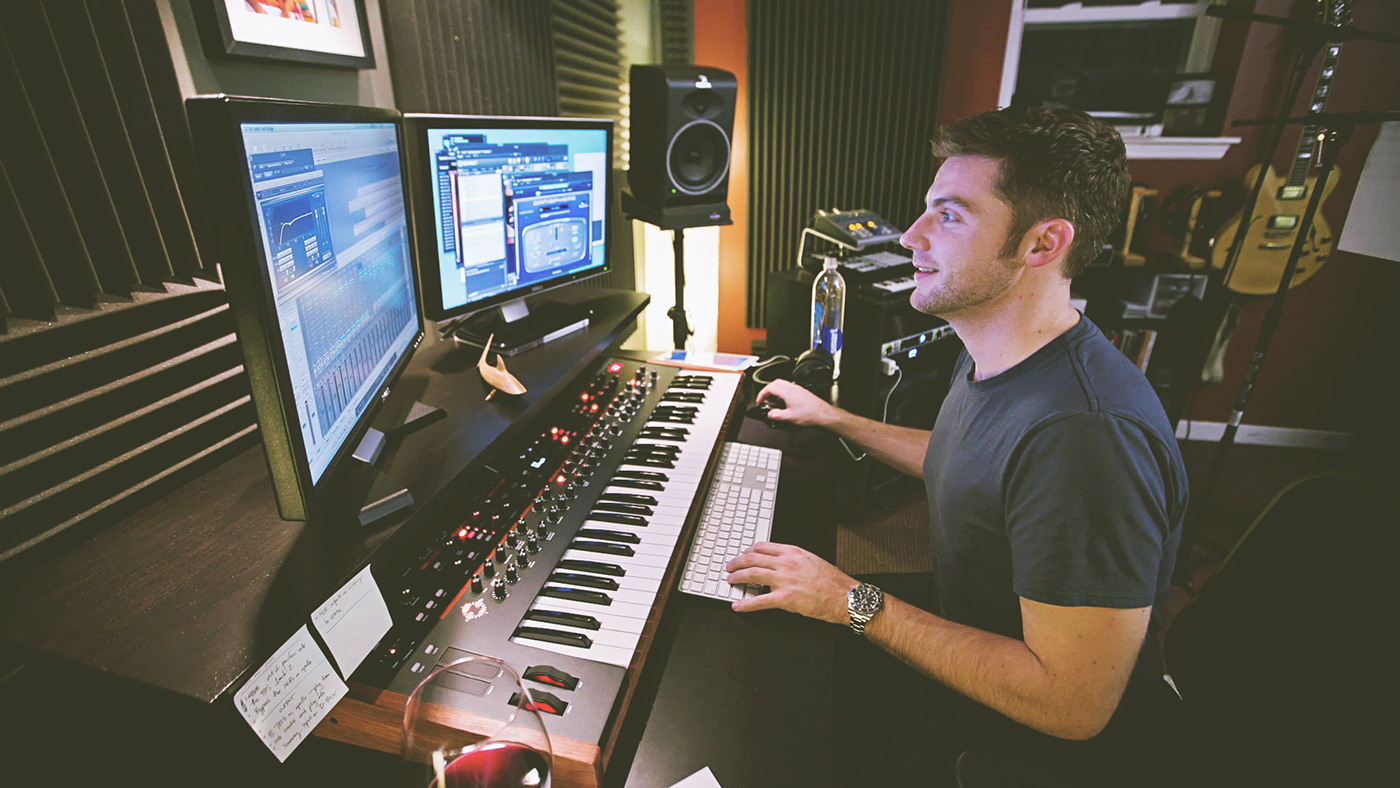
Do you worry that if you get yourself together you might lose your inspiration?
You know what, I used to. My friends have been telling me, “Man, I can’t wait till we get the old Tony back.” And I say, “Actually no, the Tony you have right now is the real one. The music you’re hearing right now is an exegesis of me.” If you were to split me open and rip out what’s in there, that’s what you’re going to get. I’m in no rush to get through this season at all. I love it. I’ve learned to embrace the pain as a friend. It’s almost like becoming best friends with a scalpel whose job is to just split you open and rip your heart out.
If my life changes, then my music will change; but it will still be me. It might have a different tone or a different flavor, but I’m never going to forget these years. I hope I won’t. To be honest, I guess I’m a little bit afraid that when I get out of this season it will change things. I just want to stay real low to the ground, real relational with people. And honestly, dude, people keep me humble. My best friends in life are the ones that are the least impressed with me.
What kind of music are you connecting with?
What I’m connecting with right now are things that take you into another world entirely. If it’s just a melody and a theme, I don’t care for it. The old model of film scoring was, okay, get a theme, get a melody. Star Wars has this theme and this melody: dadadada. The new way to do it is all about creating a world for people to step into. And there has to be sonic consistency in that world.
With Finding Home, this new score I’m working on, I set up this rule at the very beginning that nothing is going to detract attention from the film; nothing will ever be repeated in the exact same tempo or time signature. I’m not sticking with melodies and themes. I’m sticking with groups of instruments for each girl. So as you’re tracking through the film, you’ll hear these Gamelan bells show up or the solo violin. I don’t want people to walk out and go, “Wow! That was a good score!” I want them to walk out and go, “Wow! I got taken into this warm, lush Southeast Asian world where I felt like I had my heart ripped out. And I felt connected to each of these girls.”
What’s your process like now?
I don’t believe in the lazy hipster approach to making music: “We’re going to wake up at two in the afternoon, drink Intelligentsia, never shave our beards, and just kind of record organic music on the back porch.” I understand that some good stuff can come out of doing that. But I’m into creating something that outlives me, and I don’t think you can create something that has lasting value unless you put every single bit of who you are into it.

That’s why I’m so stringent. Like Seasons Chapter 1 will come out on Musicbed April first, and I’ve been sitting on those tracks for probably a year and a half. Salomon and I are working on a new track called “Dwell.” It’s a follow-up to “Rise.” I probably put 150 to 160 hours of time into “Dwell,” and just the other day I completely deleted it. I destroyed the whole project file. I was trying too hard. I was thinking about other people’s expectations, and it wasn’t really flowing from the deepest parts of me.
After I deleted it, my friend Curt came over. I started playing the progression on the piano, he plugged in his Epiphone, and all we did was throw a lexicon 224 reverb on his Epiphone and slowed the tempo down by like 30 beats per minute. And I went, “Oh my gosh! That’s it. I was overcomplicating this.” The new “Dwell” will probably have 80 or 90 fewer tracks and less layering; but it will be the right tone, and everyone will know it. It will sound unforced.

So you deleted the other files permanently?
Yes, yes, yes, yes, yes. I didn’t used to do that, but there’s something so beautiful about it. Like the other day I broke my iPhone in half. I’ve never done that before; but like I said, man, I’m in a tough season. I went to the Apple store, and the Apple guy said, “What happened to your phone?” I said, “To be honest with you, I got really angry this morning, and I broke it in half.” And he said, “Sorry to hear that. I guess we all go through things.” But when he gave me this new phone, it was this fresh start.
There’s something to that. When I go into music, I don’t want any influence on it. If I wrote something in the wrong spirit, I don’t want any of that wrong spirit to flow over to the new track. I don’t want any pollution making its way in.
I’ve decided to be the composer who releases less content than every other composer. But when I release something, you’ll know it’s gone through a series of processes. It’s been sat on for close to a year. And it’s going to make you feel something.















































































